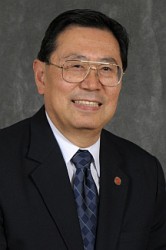
Dr. Iwao Ojima is a Distinguished Professor and Director of the Institute of Chemical Biology and Drug Discovery at Stony Brook University. His group recently published a paper in PLOS One entitled A Trisubstituted Benzimidazole Cell Division Inhibitor with Efficacy against Mycobacterium tuberculosis.
In this interview, Dr. Ojima discusses how he transitioned from working on Taxol, the anticancer compound to TB growth inhibitors, specifically benzimidazole compounds. Tri-substituted benzimidazoles have excellent activity against M.tb, reducing bacterial loads in mouse models by over 6 logs. They are especially interesting because of their mechanism of action; benzimidazoles target the FtsZ ring and disrupt cell division. Due to importance of cell division as a cellular process, resistance against benzimidazole compounds has yet to be observed. Furthermore, the compounds are equally potent against MDR and XDR-TB. Dr. Ojima is currently collaborating with Sanofi on preclinical development of the benzimidazole compounds.
In addition to discussing the promising benizimidazole compounds, Dr. Ojima expressed his thoughts on the current landscape of TB research. According to Dr. Ojima, developing a TB vaccine is of utmost importance. Prevention is preferable to treatment; if researchers develop an effective vaccine, the incidence and burden of the disease would substantially decrease. Dr. Ojima also stated that the expected profitability of TB drugs is a challenge for drug development. Since many TB patients are in middle to low income countries, TB drugs are not expected to be highly profitable. He stressed the importance of organizations like the Gates Foundation and TB Alliance for addressing the need for cheap anti-tubercular drugs.
Related Links
Institute of Chemical Biology and Drug Discovery
Additional TB R&D News
TB Lung Infection Causes Changes in the Diversity of Gut Bacteria in Mice
Diagnosis of Childhood Tuberculosis and Host RNA Expression in Africa


